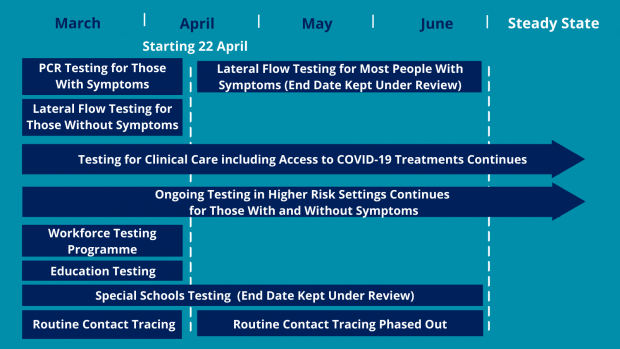Testing will continue to play a vital role in Northern Ireland’s response to the COVID-19 pandemic over the coming months, Health Minister Robin Swann has emphasised.

The Minister announced that a more targeted approach to testing will be introduced on a phased basis from next month, with the focus on supporting and protecting those at highest risk of serious illness. Testing will continue to be available for those eligible for COVID-19 treatments.
Under the new policy, PCR testing will cease for most people with symptoms from 22 April - however free lateral flow tests will continue to be available to the public to use should they develop symptoms of COVID-19. Lateral flow tests will also continue to be available free of charge to support those living in, working in or visiting a higher risk setting such as a care home until the end of June, with further review then.
The policy covers testing and contact tracing and takes effect from 22 April. No changes will be introduced until that date. The policy will be kept under review during the period of transition up until the end of June.
The Health Minister stated: “The new policy reflects the new realities of the pandemic. While the prevalence of the virus remains at a high level, the risk of serious illness has been significantly reduced - thanks in no small measure to our vaccination programme and the use of innovative COVID-19 treatments.
“The risk posed by the virus at the present time does not justify testing and isolating large swathes of the population at the levels that we have seen to date in the past two years. Test and trace will continue to have a key role and will be used in a more focused and targeted way to support and protect our most vulnerable. This will be kept under very close review and we will have contingency plans in place so that we can scale up should it be required.”
A range of changes will take effect from the 22 April:
- PCR testing will no longer be recommended or available for most people with symptoms. It will still be available to support the small group for whom it is recommended for clinical reasons. The PCR home ordering service will remain available for the general public to support those for whom PCR is recommended.
- publicly accessible COVID-19 testing sites will close. Local Health and Social Care Trusts will continue to provide PCR testing to support clinical care.
- those with symptoms will be advised to use lateral flow devices (LFDs) to test instead of booking a PCR. This will be kept under review and could remain in place up to the end of June depending on disease trajectory.
- routine asymptomatic testing (that is testing for those with no symptoms) will continue to be advised for those living, working and visiting health and social care settings including hospitals and care homes and other high risk settings in line with public health advice. This will be kept under review.
- asymptomatic LFD testing for the wider population will cease. Access to free LFDs for this purpose will cease.
- routine asymptomatic workplace testing will cease.
- routine asymptomatic testing in most educational settings (including mainstream schools, early learning and childcare, universities and further education colleges) will cease at the Easter break.
- asymptomatic testing in special schools will continue after Easter and will be kept under review. It may continue until the end of June 2022.
- routine population contact tracing will be phased out between mid-April and the end of June.
 Test and Trace Transition Plan
Test and Trace Transition Plan
Chief Medical Officer Professor Sir Michael McBride said: “We will continue throughout the transition phase to support and protect our most vulnerable. After these changes are introduced from 22 April, I would urge people to check on NI Direct if testing remains recommended for them - for example if they are eligible for new treatments. In the coming weeks, the Department will also be working to provide advice and support to those eligible for treatments. It is particularly important that those who are at higher risk of serious illness follow the guidance on getting tested.”
The Chief Medical Officer added: “The tools at our disposal to protect people who are at higher risk from COVID-19 have advanced considerably since the early days of the pandemic. Alongside the vaccine and booster programme, new COVID-19 treatments continue to be used by patients in Northern Ireland and new treatments are in development.
“As the amount of testing across society reduces, our behaviour and actions have an even more important role in preventing transmission and keeping others safe. I urge everyone to continue to follow the public health guidance including continuing to wear a face covering in enclosed settings like public transport and when visiting hospitals and care homes.”
The changes do not take effect until 22 April, and current testing provision will continue until then. Please keep following the latest public health advice as set out on NI Direct.
Notes to editors:
- The Test and Trace Transition Plan can be accessed on the Department of Health website from 1pm.
- The latest guidance on Testing can be accessed on NI Direct - Coronavirus (COVID-19): testing | nidirect
- The latest guidance on Self-isolating and Close Contacts can also be accessed on NI Direct - Coronavirus (COVID-19): self-isolating and close contacts | nidirect
- For media enquiries please contact the DoH Press Office by email pressoffice@health-ni.gov.uk.
- Follow us on Twitter @healthdpt.
- The Executive Information Service operates an out of hours service For Media Enquiries Only between 1800hrs and 0800hrs Monday to Friday and at weekends and public holidays. The duty press officer can be contacted on 028 9037 8110.
